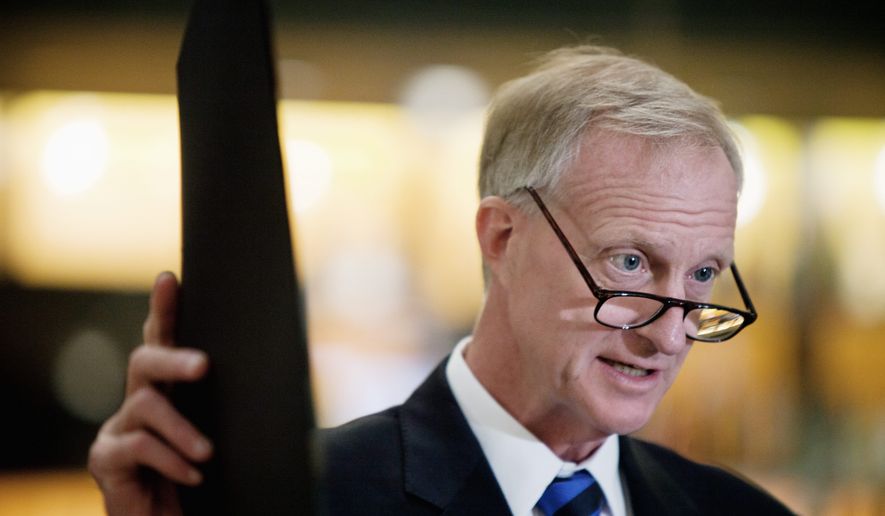D.C. Council committees have rejected both a full expansion of the police department’s body camera program and a plan to raise taxes, doling two significant blows to Mayor Muriel Bowser’s budget proposal.
The Committee on Finance and Revenue on Wednesday rejected including a .25 percent sales tax increase and a 4 percent parking tax increase in the budget, with committee head Jack Evans calling the proposals fiscally irresponsible.
“In this budget our revenues are actually increasing a healthy 3 to 4 percent. So to increase a tax when you have a revenue growth like that is not a responsible way to do budgeting,” said Mr. Evans, Ward 2 Democrat.
Ms. Bowser’s proposal calls for increasing the city’s 5.75 percent sales tax to 6 percent, a move she said would net $22 million that would be dedicated to addressing homelessness.
Mr. Evans said the notion of tying the tax to fund programs for the homeless is “just rhetoric” because the money would be deposited into the city’s general fund. He also decried an increase in the parking tax from 18 percent to 22 percent — which would raise about $10 million in additional funds — despite the dedication of the money to fund Metro, noting that the city pays more than $300 million annually to subsidize the transit agency.
Mr. Evans, who sits on the Metro board, recommended the parking tax revenues be deposited into the city’s general fund, saying it would be more beneficial to secure funding for the transit agency through regional sales and gas taxes.
SEE ALSO: D.C. tops best states for preschool access
Council member Elissa Silverman tried unsuccessfully to restore the two tax increases in the committee’s proposal; her amendment was defeated 3-1.
Complaints over transparency in the body camera program due to the police department’s inability to redact and publicly release video footage led the Committee on the Judiciary on Tuesday to recommend reducing funds for expanding the plan. Rather than grant the $5.1 million sought to purchase 2,400 body cameras, the committee, led by Kenyan McDuffie, signed off on the purchase of 1,200 cameras at a cost of $1.9 million.
The committee report said the Metropolitan Police Department is “not logistically prepared” for the full roll-out and noted that the department has neither the policies in place nor enough data about its six-month pilot program to garner support.
“Such an unprecedented program must be based on data — data which might have supported a larger rollout had it been collected during the Department’s pilot program,” the committee report states.
Police Chief Cathy L. Lanier testified last week that it would be extremely labor intensive to redact videos before releasing them to the public and that the department does not have the technological capabilities to do so. She recommended that the department move forward with the program with an exemption that would prevent body camera videos from being released in response to Freedom of Information Act requests, saying the council could later draft regulations to outline public disclosure when the technology becomes available.
Through a spokeswoman, Ms. Bowser said the council’s proposal to cut the funding “takes us two steps backwards.”
In a letter to D.C. Council Chairman Phil Mendelson, Ms. Bowser said the cameras would increase police accountability and that footage would still be available for review by authorities to ensure that “justice is served.” She said her administration intends to draft regulations that could guide the use and handling of the cameras and video.
Mr. McDuffie’s committee said the department can still move forward without the full contingent of cameras.
“The Committee believes that MPD should begin with a smaller number of cameras in order to work out many of the policy considerations that exist,” the report states.
The full D.C. Council will still have to take the committee recommendations under consideration and vote on a full budget package by the month’s end. But the addition of two new lawmakers to the D.C. Council leaves some uncertainty in the future of the committees’ recommendations.
Brandon Todd and LaRuby May, winners of special elections in Wards 4 and 8, respectively, are to be sworn into office Thursday. Both have close ties to the mayor — giving Ms. Bowser new allies who could be crucial in determining the fate of the budget proposals.
• Andrea Noble can be reached at anoble@washingtontimes.com.




Please read our comment policy before commenting.